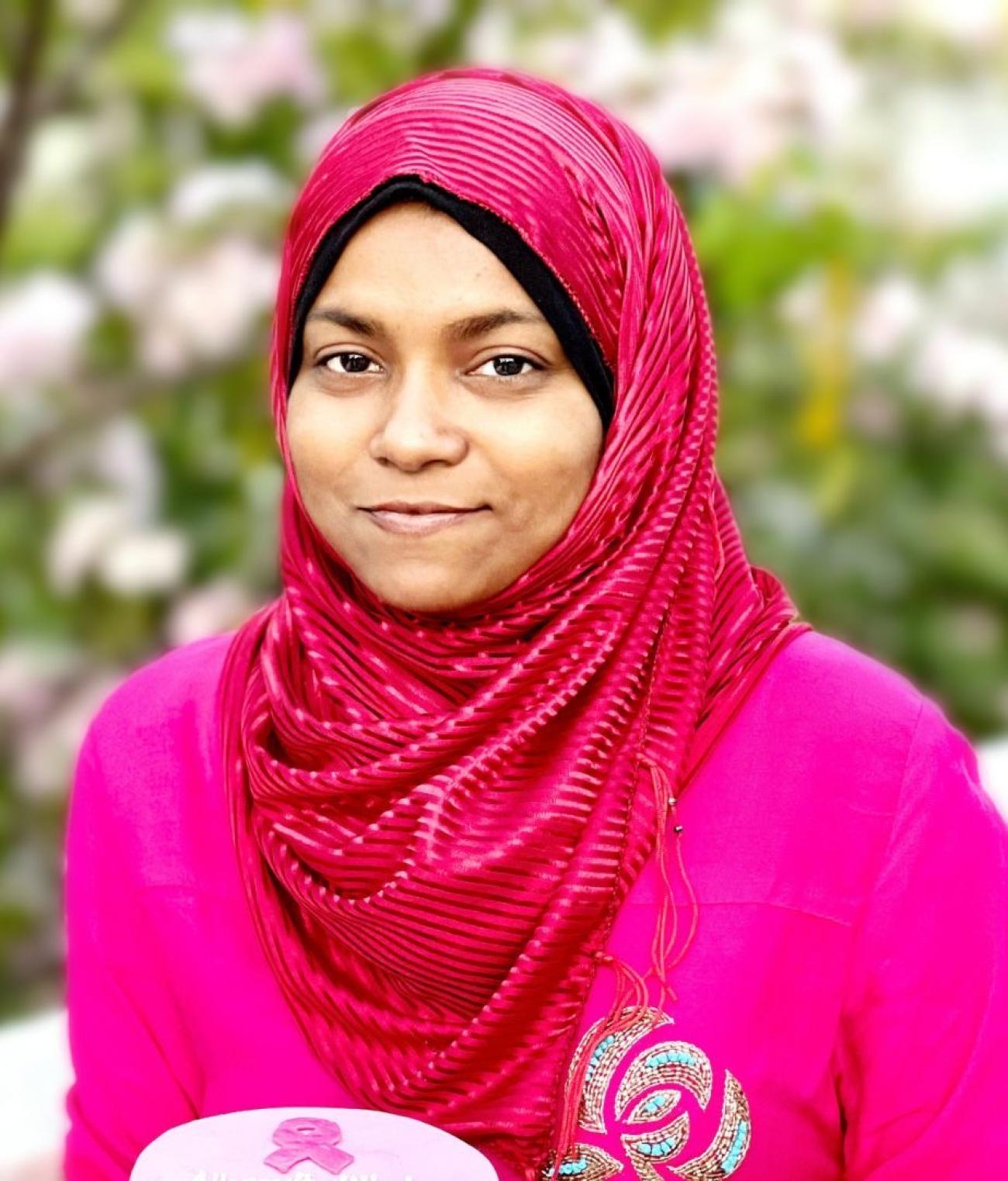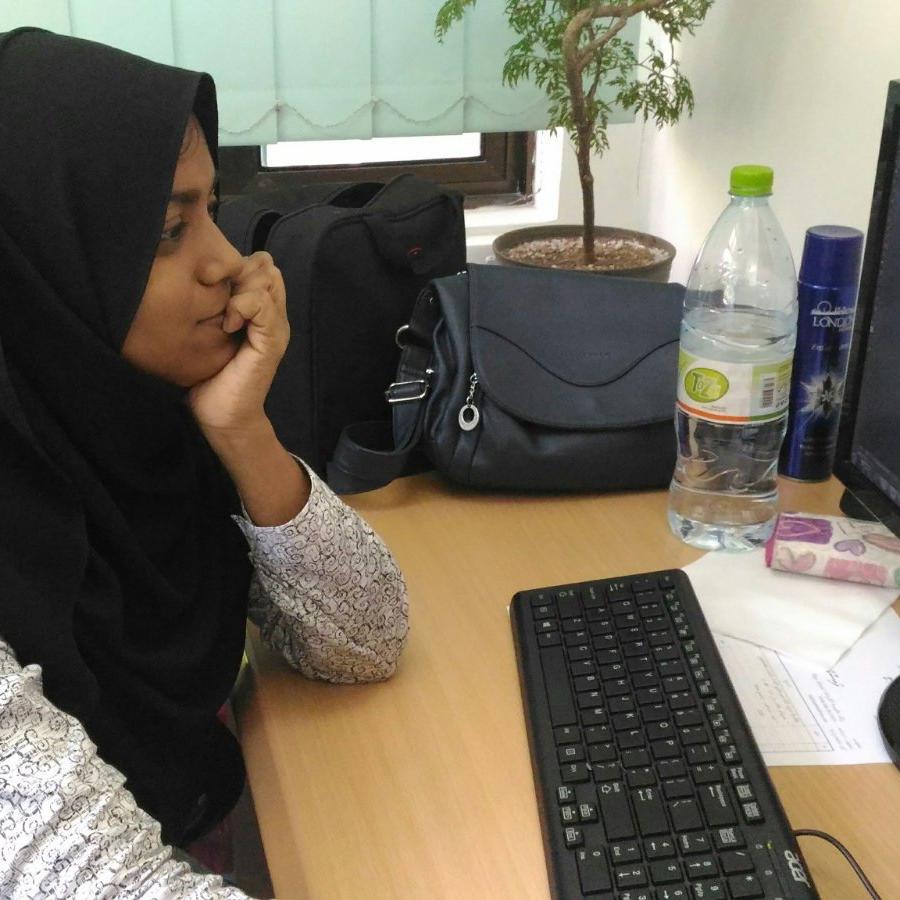Aroosha Abdul Sattar, an Information Technologist

On behalf of International Women's Day 2023, we bring to you the inspirational stories of women who are working in various fields.
Working in the Information Technology Industry of the Maldives since 2010, Aroosha Abdul Sattar (Aru) can be described in many words but can be summarized as a truly resilient woman who has independently built herself from the ground up. Though she stands tall in the IT field today, she certainly did have her fair share of curveballs thrown her way. For International Women’s Day 2023, WHO sat down with Aru; a proud single mother, a female leader in ICT, an educator, and a cancer survivor.
Back in the day, a comprehensive education system did not exist for young children growing up in the small island nation of Maldives that supported nor prepared students to join the IT workforce. “When I was younger, I did have interest towards IT as an area of work. However, there weren’t many job opportunities at all because technology wasn’t advanced and evolved like it has now. In fact, it was only after I studied abroad on a scholarship that I learned the scope of this work and how huge it was.” Aru recalled. “I was fortunate to have a computer and a dial up connection to access the internet from home. This is where I learned to use a computer; at home, during computer class at school and in the library. I eventually started to access the internet from cyber-cafes because it was too costly to keep a dial-up connection at home.” Before her education in IT even began, she had already taught herself critical thinking and problem-solving skills and to trouble shoot, clear viruses, repair and assemble personal computers.

Eventually when she moved overseas to get a formal education, she additionally decided to enroll herself in graphic designing, 3D animation and other skill-based courses which led her to work in a 3D Studio overseas and do freelance graphic designing work. “Even when I gained the initial knowledge and skillset, I was not sure which career to pursue in Maldives because of the lack of opportunities, especially for women in ICT. The industry as we knew it was more male-dominated, and the highest attainable IT-related Government job position was ‘IT Technician’ - not exactly an area of work where women were sought after.” Aru explained. “These are some challenges that exist then and now too. If there had been more opportunities such as internships to help prepare school graduates to integrate themselves into the corporate IT world, it’ll provide them with a clearer pathway.”
Never in her life had it been easy for her to sit sedentary in one place and work. She was more interested in work that required her to get up and move, such as building hardware. Despite her proven expertise in the field, she did hear the occasional diss from co-workers that this was a ‘labor-intensive work which is not suited for a woman’, especially with Aru raising a child alone, while studying, working and providing for the child. “If you have passion towards doing something, you’ll find a way to do it.” Aru shared, “When I worked primarily as a graphic designer and web developer, I also tried to tap into the work my male counterparts oversaw such as setting up networking systems. They did allow me to take part in the work to some extent, but not as much I would’ve wanted, and definitely not as much as a male counterpart had the chance to.”
Today, Aru holds a master’s degree. But even in her earlier work settings, since she didn’t always get a chance to do certain work, which she believes hindered her from growing professionally. “What one studies or observes in a classroom versus real life experiences are completely different.”. In fact, from the beginning of her career till 2022, Aru had been the only female in the ICT departments of workplaces she had worked in. It was only from years 2022 to 2023 when she was able to work with more females in a team. “Unfortunately, still, some people’s mindsets are that women cannot work in IT related fields due to their perceived notion of gender roles (such as being a wife, a mother etc.). IT work can also lead both men and women to follow careers which allow remote-working; especially in bigger companies.” said Aru. “Challenges can happen to anyone whether they are female or male. But when it comes to women and the challenges we face; we are often misconstrued, scrutinized, and seen as a burden. On the plus side, Maldives is much more digitally advanced now compared to the early 2000s. And in comparison, to about four, five years earlier; there are a lot more opportunities for women in IT now.”
Ever since she first joined the IT field, she has always been a single parent who has gotten by with a lot of support from her family, colleagues and loved ones. “My sister has been an inspiration for me because she is a very independent woman. No one knows how life can turn out for any of us but becoming independent and being mentally prepared to face any challenge is important and my family, friends and colleagues have supported me to view life from this perspective.”
Aru’s world turned upside down when she was recently diagnosed with Cancer. “I got a lot of support from my workplace, Bank of Maldives. And despite this huge setback, I requested the management to allow me to work, and they complied. Battling with cancer, a lot of my time and energy went into treatment. To fight cancer, I had to stop everything else because my only priority was to stay alive. Still the management at Bank of Maldives gave me a lot of flexibility to work remotely and in my own time. This was a huge blessing for me, one that does not go unacknowledged or unappreciated. Even when I was receiving treatment abroad, I was working from home, and I am so thankful that I get to work at such an accommodating, caring workplace.” She also took note that people and corporations are much more aware and educated on women’s rights issues nowadays and a lot more competition exists in the field now because organizations prioritize hiring women to ensure a gender balanced workplace and to support women’s empowerment
And yet till this day, Aru continues to come across young girls who see IT as a complicated line of work. During her time as a lecturer and a mentor, she has advocated to young girls and encouraged them to work in this field because she believes it is an area of work where people can have a lot of flexibility despite their health or socioeconomic status.
“In 2018 I was introduced to the NGO ‘Women in Tech Maldives’ where I met like-minded professionals. We got to share our experiences and challenges. I acknowledge ‘Women in Tech Maldives’ as they played a huge role in advancing opportunities for women in the ICT field. Networking events were unheard of before, but with credit to them; there are more opportunities for women in this field to meet, mingle and receive mentorship from technically-sound professionals.”
In recent years, Aru became the Chief Operating Officer of a startup tech company working alongside experienced professionals in the industry. Aru shared that the team’s proudest achievement thus far was building an artificial intelligence application together as a team. By digitally profiling people, the application can provide guidance, recommendations, and coaching to its users based on their strengths, weaknesses, and unique attributes. “It is a highly adaptable tool and a technology that has not existed in the Maldives before. I am also someone who did not know my own strengths and weaknesses and didn’t get any guidance on which area of work to pursue so with the power of technology these things can also be simplified in today’s world.” Aru shared proudly.
When asked about her thoughts on adapting and harnessing digital technologies to Health which is a global priority for WHO, she shared that the possibilities for digitalizing the health sector of Maldives were endless especially with today’s advancements and opportunities. “There are so many possibilities; reports and prescriptions no longer need be paper-based. Digital technologies can be utilized for e-health, telemedicine, and to keep databases (such as health and vaccine records). The digital utilization during COVID-19 is a good example. However, as I see it, there are many more tools available and we also have a skilled workforce who are fluent in IT. The demand and usability will also be high as health services aren’t limited to one patient demographic or nationality, but also can be used by health workers and other multisectoral partners too.”
In her career, Aru has mentored young girls she met during ICT events and has also taught basic computer courses to non-tech savvy older adults from different cities and islands of Maldives. Additionally, when she spent time teaching students as a lecturer, she guided them to choose this career path when many of them were still unsure what field they wanted to pursue. “When I see them advancing in their careers now, I feel like it’s my own personal achievement too.”
On the occasion of Women’s Day, Aru wants to remind all young women and girls in ICT, STEM, and other fields of work to remain keen, curious and self-educated. “In life, women do have to face a lot more challenges than the opposite sex. This is not just in work, but also in our biology. So, despite the curveballs, always keep your head above the water no matter what field you decide to pursue. Don’t let the momentum slip and always be one step ahead of yourself. Despite having cancer, I never abandoned my passion for IT, and I never stopped believing in myself. My advice is, don’t give up on yourself even if the situation changes for you. Every workplace has challenges but take them as learning opportunities.”
Aru believes that in the digital era we currently live in, a lot of things come at ease. “I believe comfort zones are our enemy so always stay outside of it. As young people, we should strive to be an expert in the niche that we have started to work in, so that no one can reject us. At the end of the day, they need our talent and expertise more than they need a woman or man to do the job.”



